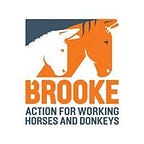The ‘invisible workers’ supporting the SDGs
Carine Bambara, Global External Affairs Manager, shines a light on the working livestock that contribute to the Sustainable Development Goals and to national economies through partnership.
Working livestock, especially horses, donkeys and mules, contribute to the livelihoods of 600 million people living in some of the poorest communities around the world. Yet their contribution to sustainable development is largely unacknowledged.
As an international development professional working in the UN system, I had seen hundreds of working animals, working alongside humans when visiting projects on the ground: horses ploughing the fields, donkeys taking goods to market, mules transporting bricks at a construction site. But it wasn’t until much later that I really understood the relationship between these animals and the livelihoods they support.
And yet it is a story that has been in front of my eyes all along. My grandfather was a farmer in Burkina Faso who managed to send all of his 10 children to school. When asked about how he managed it, he would talk about his donkey, horse and other livestock that enabled him to make a living and give his children, daughters and sons alike, an education.
This brief glimpse into this real story highlights the vital work done by this livestock species every day, lifting some of the world’s poorest people out of poverty. These invisible workers support the Sustainable Development Goals (SDGs). At the United Nations High Level Political Forum (HLPF) in New York this month, we will be hosting a side event as part of a coalition bringing other development partners together to see how we can support the communities that depend on these animals the most.
Working horses and donkeys can also support women’s access to markets, thereby contributing to SDG 5 on gender equality and empowerment. This can be seen in an example from UNICEF in Burkina Faso where widowed women and other single parent households were supported with donkeys and carts to start what became a successful business. The contribution of horses, donkeys and mules to women’s economic empowerment is also evidenced in Brooke’s Voices from Women report. The report cites Guddi, a young woman from India, saying:
“Even though donkeys are smaller, they make more money for us”
These animals help build resilience of many of the rural poor that have been left behind economically in different parts of the world. When there is a climate related shock, horses, donkeys and mules help families move from difficult places for resettlement. Their ability to work in different contexts e.g. carrying goods and people to market, ploughing etc., means that people can diversify their economic gains if, for example, a climate related incident ruins the land they work on.
Brooke’s Invisible Workers report describes Pakistan as an example of a setting where working horses, donkeys and mules, through draught power, support 100% of the annual income of households reliant on crop and milk sales, thereby supporting SDG 1 on poverty reduction. The title of our side event at HLPF focusses in on how much working livestock supports economies and we will draw on more examples like this to see where there are cross overs with some of our potential partners. Working are not the answer to all international development challenges but they are certainly a big part of the picture which has been neglected for a while and it is only through partnership that we can support countries to achieve the SDGs.
The SDGs are interconnected and require a collaborative approach to tackle them comprehensively. We look forward to meeting potential partners at HLPF 2019 to discuss how, by working together across the human development, animal welfare and environment sectors, we can meet the SDGs by 2030.
